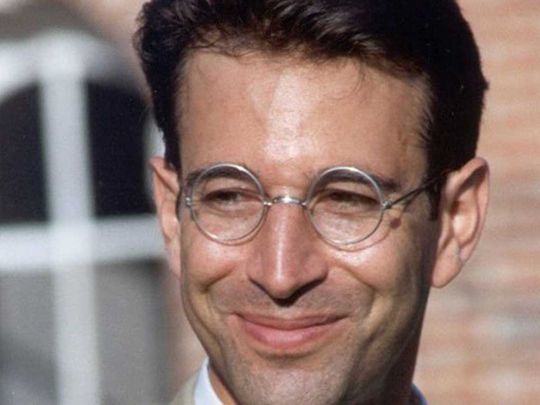
Dubai: The brutal murder of American journalist Daniel Pearl came to limelight once again on after a Pakistani court released the convicts after 18 years.
The Sindh High Court acquitted three persons accused of being involved in the kidnapping and murder of Wall Street Journal reporter Daniel Pearl back in 2002. The court also converted the death sentence of the main convict Ahmed Omer Saeed shaikh in to a seven-year imprisonment. Since shaikh has been in prison for the past 18 years, his seven-year sentence will be counted from the time served.
The court has also acquitted three other co-accused in the case, Khawaja Naveed, a defence attorney involved in the case journalists on Thursday.
At least four people had been convicted in connection with Pearl’s murder, including British-born Ahmed Omar Saeed shaikh, who was sentenced to death in 2002 for masterminding the murder.
A two-judge bench of the high court, headed by Justice Mohammad Karim Khan Agha, had reserved the judgement last month after hearing the arguments of the appellants and the state counsel, Geo TV reported on Thursday.
British national
British national Omer shaikh had been sentenced to death for kidnapping and killing Daniel Pearl by a court in 2002, and his three accomplices — Fahad Naseem, Syed Salman Saqib and Shaikh Mohammad Adil — were sentenced to life imprisonment with a fine of Rs500,000 each.
38-year-old Pearl, a US national and the South Asian bureau chief of American publication The Wall Street Journal, was kidnapped on January 23, 2002, in Karachi and later beheaded by his captors when their demands regarding his release were not met.
Defence arguments
The counsel for the defence, Rai Bashir and Khawaja Naveed Ahmed, had submitted to court that the prosecution had failed to prove its case beyond reasonable doubt. “Ahmed and the three other suspects had neither aided, abetted, or participated in the alleged crime of kidnapping for ransom,” it was argued.
They submitted that the prosecution witnesses in the case against shaikh and others were mostly policemen, and their testimonies could not be relied upon. They said there was no eyewitness to the crime and the prosecution relied upon very weak circumstantial evidence for conviction.
The deputy prosecutor-general, Saleem Akhtar, supported the anti-terrorism court judgement and submitted that the prosecution had proved its case against the appellants beyond any shadow of a doubt and requested the court to dismiss the appeals.
Court dismisses state appeal
After hearing arguments and examining the record and proceedings of the case, a two-judge bench headed by Justice Mohammad Karim Khan Agha announced the verdict on the appeals filed by the convicts 18 years ago. The SHC further dismissed an appeal of the state seeking enhancement of life term of three co-accused.
Pearl was kidnapped and beheaded in 2002 while he was in Karachi researching a story on religious extremists in Karachi after 9/11 incident. His murder shocked the world and even a Hollywood movie was also made detailing his life and murder.
A Sindh prosecutor said he would consider appealing against the court’s decision. “We will go through the court order once it is issued, we will probably file an appeal,” said Faiz Shah, the provincial prosecutor general.
Daniel Pearl
Daniel Pearl also nikmaked Danny, went to Karachi during his days when he was the South Asia Bureau Chief of The Wall Street Journal, based in Mumbai, India.
In July 2002, Ahmed Omar Saeed Sheikh, a British national of Pakistani origin, was sentenced to death by hanging for Pearl’s abduction and murder. In March 2007, at a closed military hearing in Guantánamo Bay, Khalid Sheikh Mohammed, a member of Al-Qaeda, claimed that he had personally beheaded Pearl.
The Daniel Pearl Foundation was formed in 2002, in memory of Pearl, to promote the ideals that inspired his life and work. The Foundation works domestically and internationally to promote cross-cultural dialogue and understanding, to counter cultural and religious intolerance, to cultivate responsible and balanced journalism and to inspire unity and friendship through music.
Who is Ahmed Omar Saeed Sheikh
Ahmed Omar Saeed Sheikh Sheikh, the main covinct in the Pearl’s case went to school in London. He was son of a prosperous Pakistan-born businessman and also briefly studied at the London School of Economics before dropping out to join an organisation coordinating relief efforts for Muslims during the Bosnian war.
Radicalised by his experience in the Balkans, Sheikh travelled to Pakistan where he joined an extremist group. After several months training in camps in Afghanistan, Sheikh was sent to India to kidnap tourists to secure the release of a senior militant imprisoned there.
Captured in a police raid, he was imprisoned in India but was released when extremists hijacked an Indian airlines plane in 1999, and he travelled back to Pakistan.
Sheikh set a trap for Pearl in the first days of January 2001, though his exact motives are unclear. He eventually gave himself up to civilian authorities after Pearl’s death.








